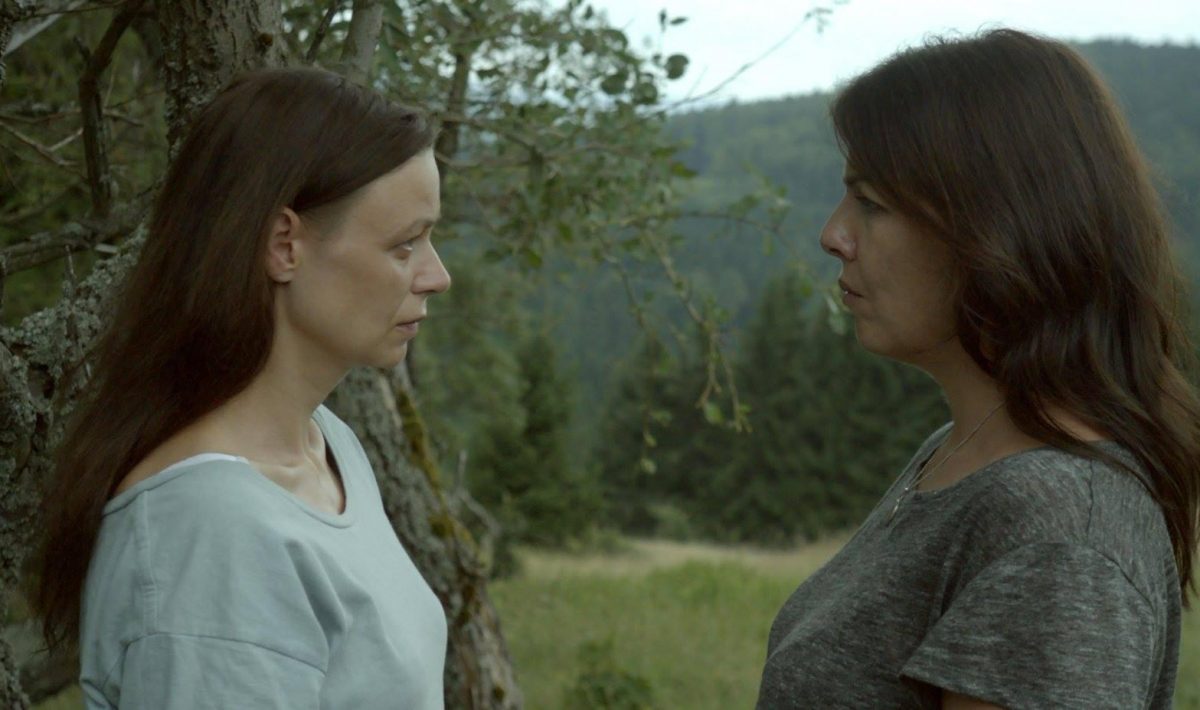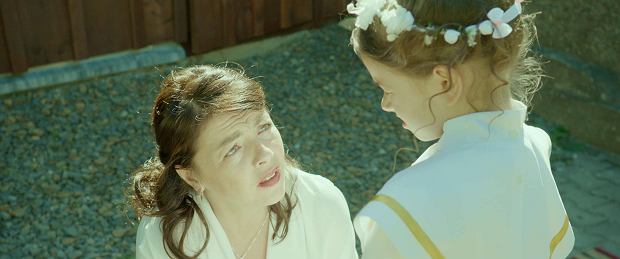I have not seen a Polish film, which would make such a brilliant – and frightening – diagnosis about our Polish identity and national problems, for a long time. Jagoda Szelc plays very effectively on fears deriving from rational-irrational tension. Fears that have become one of the fundamental elements of everyday life in Poland.
Since one tragic April day, they have been constantly scratched and deepened. Jakub Popielecki from Filmweb rightly notes that the Tower. A Bright Day. is a kind of prophecy (“based on future events”), warning us of the inevitability of return of the romantic paradigm and the consequences of it.
The plot points to a limited, dramatic recipe – a closed family drama taking place in the countryside (Kaszuby). Mula and Michał are preparing for the first communion of their daughter Nina. Mula leads the family, taking care of her mother, Ada, apart from household matters. The rest of the family comes as well. Andrzej, Mula’s brother, with his wife Anna and two daughters, and Kaja, Mula’s sister, who is her opposite – a wild person, behaving a bit like a shaman, a bit like a witch, having an unusual relationship with nature. We quickly learn that Kaja, not at all Mula, is Nina’s biological mother and returns to her family as a fugitive.
Family drama is actually just a background for fumbling with fears. The tension axis is embedded between the sisters. Mula, the voice of reason, rationalizes, organizes and controls (this can be seen at the very beginning, e.g. when he reads Kaja’s list of rules – what Kaja is allowed to do in context of her daughter and what not). She copes badly with everything that disturbs the order of her world (e.g. Nina is not able to answer, why communion is necessary, concluding that it is about belonging to the community; another example is the scene by the fireplace – Mula reacts aggressively to the unknown). In turn, Kaja is the reverse of her sister. She does not fit within the community, she stays out of the way, but she embodies the irrational (e.g. Ada’s dementia vanishes like a bad dream). I associate Kaja’s behavior with conducting a kind of social ritual (something like a shamanistic practice from Bartosz Konopka’s and Piotr Rosołowski’s The Art of Disappearing from 2013, but here the effect is not necessarily positive).
The collision of these two worlds results in the fact that reality seems to burst (like a glass into which Anna pours water). This can be seen in the montage of the image and sound, e.g. in showing, repeating some scenes from two perspectives – an ordinary walk becomes disturbing and full of tension and anticipation for something – or in moments of strange noise, whispers and clicks that have accompanied us since the beginning of the film. Kaja slowly seems to dominate and conquer this rational, rural world. Are we able to defend ourselves against this, or will Szelc’s diagnosis really turn out to be true and – just like in the movie – we are facing collective paranoia?
After April 2010[1], we unexpectedly found ourselves in a completely different, though known from elsewhere, world. In a world that had been lethargic before and needed something to feed on. In a world of resentments dating back to the nineteenth century, in a world of conspiracies, underground activity, strong emotions and martyrdom, faith in patriotic, collective “we”, clearly separated from “you” and “they”.
There were already films that tried to take up the subject and tell about social moods. An example would be Lech Majewski’s Onirica from 2013. A film that is bursting with kitsch of naive patriotism and belief in a united community. A terrible fossil – does anyone else believe in such monoliths? Obviously, Antoni Krauze’s Smoleńsk is another approach. Referring to the excellent text by Marcin Napiórkowski, this is a kind of pornographic conspiracy. Perverse waiting for a sexual act – an explosion of an airplane.
Jagoda Szelc – consciously
or not – gets to the heart of the problem, narrating like a prophet of the
Romantic era. That fear of the future possessed by the past was what made watching
the Tower. A Bright Day. such a
terrifying experience. I had shivers on my back. A great film debut that we’ve
been waiting for a long time and to which’s weaknesses we can turn a blind eye.
[1] I write it from Polish perspective.







